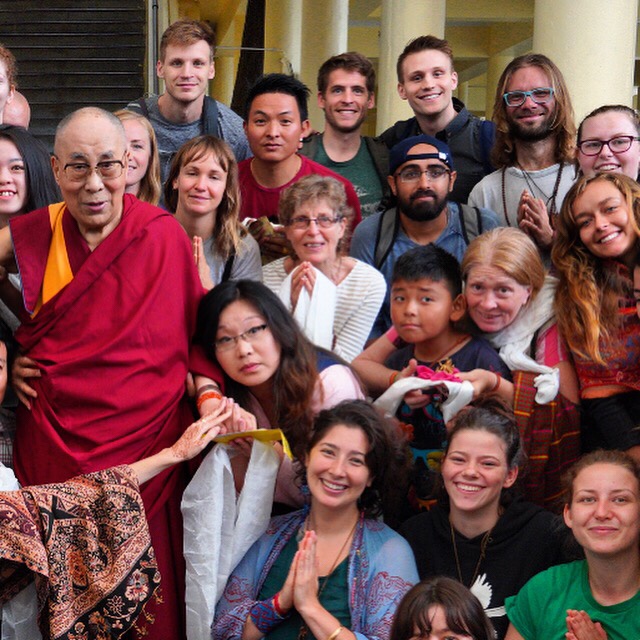
For four days that included my 33rd birthday, I attended teachings of the Dalai Lama on the sutra, “A Guide to The Boddisattva’s Way of Life” composed by Shantideva.” The first three days of teachings were aimed at Tibetan Students with foreigners invited to listen by personal radio to real-time translations. The fourth day of teaching was a Q and A conducted in English for foreigners in a more intimate setting.
The book is a game changer, a gorgeous guide for living at peaceful with oneself and others. The Dalai Lama’s overall message was on of compassion, mutual understanding, and freeing oneself from the grips the tendencies that keep us “slaves to sensory gratification.”
It was an inclusive message for all religious perspectives and even spoke of the need to keep none-believers as an important part of religious dialogue.
It was exactly the sort of message our divided world needs, delivered from a man whose presence is felt and happiness beams. I thought of a line from one of the poems I’ll be including in a book of poetry I hope to put out this fall, “No need to worry about whom to believe, notice who’s happy.”
What isn’t helpful these days is the “I am right, you’re wrong” attitude when it comes to looking from your belief to another, or the equivalent, the “you have some of the truth, but I have all of it.” There’s no space for humility in such a mentality driven by spiritual pride and arrogance. As the Dalai Lama said, “At the base of arrogance is self grasping.”
Regardless of what we believe, it’s important to check in with that and take an honest look how we carry our own views it in a world that cherishes a myriad of religious perspectives.
Here are a few notes I jotted down from four days of teachings from The Dalai Lama.
On Religion
“All major religions have good messages and teach love and compassion.”
“Saying my religion, their religion, causes division and there’s no reason to do that.”
“You can keep faith in your religion while being accepting of others.”
“All major religions teach love, compassion, and all have have helped humanity.”
On Compassion
“Tame your enemies through love and compassion.”
“Being compassionate will help combat the disturbances of the mind.”
On Self Grasping
“Grasping at the self causes suffering.“
“Do your best not to be irritated in irritating situations.”
“When you feel offended, this is your fault because you cherish yourself too much.”
“You are your own master, you overcome suffering by looking into the cause of suffering.“
“To practice patience, you need someone who provokes anger in you.”
“The more you are selfishly involved, the less you will be happy.”
“The selfish attitude is the source of all mental afflictions.”
His message was one of personal empowerment, “The Buddha can’t do much for you other than guide you to a path that you must walk. The ultimate goal of the Buddha was to guide all beings to the state of complete happiness and compassion he had reached.”
Parts of his message resonated with the message of Christ, “say to your enemies, whatever you want you can take. If you want my flesh take it, for what they can never touch is your compassion towards them.”
On Science and Education
“Science says basic human nature is compassion.“
The Dalai Lama cited a scientific study in which infants showed joy at seeing one child help another child push a ball up a hill. When the same infant saw a child thwarting another child’s effort, he showed distress.
“Human nature is compassion, I think existing education is the problem. Indian education should include ancient knowledge.”
“The modern mind is a slave to sensory experience.”
The Dalai Lama believes that we must use our intelligence to develop dormant compassion. He says modern education is used for material development. The consequence is compassion becomes dormant.
He believes that all teachings of Tibetan Buddhism must use logic and that even certain teachings from the Buddhist scripture should not be taken literally if they do not stand up to the test of reason.
He is proud of Tibetan Buddhism because many other religions are not able to sit down with scientists. But that is exactly what he has a history of doing. In this way, both the religious understandings and scientific understandings are enriched through unguarded dialogue.
“Western psychology is at its beginning stages compared to Indian and Tibetan science of the mind.” He has made part of the mission of his influence to revive some of this ancient Indian wisdom that can serve the world today.
Several years ago I would have thought this a convenient opinion—but delving into the Vedas and other ancient scriptures shows that our western education has put its own discoveries as prominent while ignoring the vast depth of ancient wisdom and understanding of the human mind that’s developed outside the western mind.
When a Tibetan gradeschool girl asked the Dalai Lama to elaborate on genetics, he said in humble deference, “In the material world, some science explanation is more precise than the Buddhist one.”
On Society
“We should never use the term, ‘Muslim terrorists,’ Otherwise, we should use the term ‘Buddhist terrorists’ in Myanmar. This is the 21st-century, we must look from a wider perspective.”
“As social animals we should look at the community as a whole. If you remain alone, you will not be happy. The community you live in is the basis for your own happiness.“
“In the practice of altruism, we need to practice patience with anger.“
“When you feel that you are with no one to help, then you really go into suffering.“
“People work so hard for merits and livelihood, but so far we have remained selfish, which is why we are where we are.”
When asked about whether self-immolation was right or wrong, as some Tibetan monks have done, he said he didn’t know and advocated a perspective of non-judgement, “Certain actions fueled by certain intentions are ok for some that aren’t for others in certain circumstances. Who am I to say if such an action is right or wrong?”
“India is a good example for democracy. For over 1000 years there have been all the religions of the world living together at peace. India’s press enjoys their freedom, so they make small disagreements into much bigger problems.”
***
Thanks for reading and your support. Please check our my books here and join my community on Facebook.





